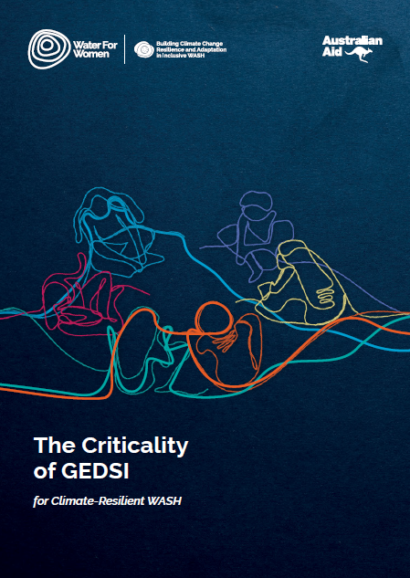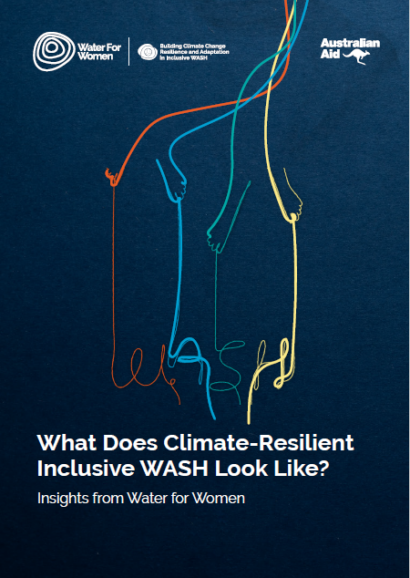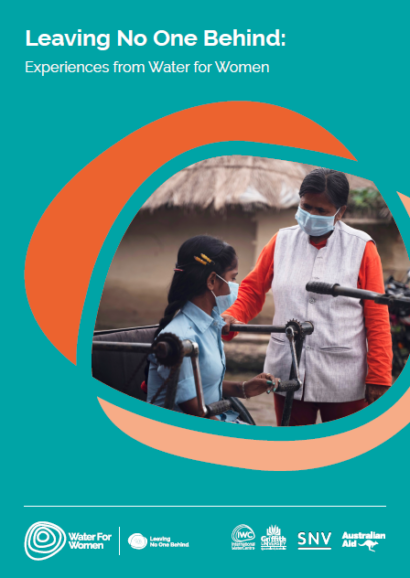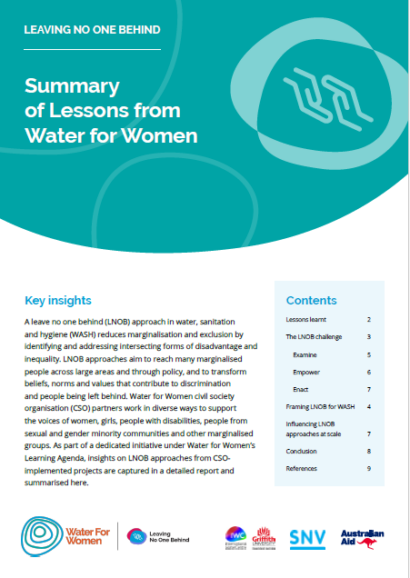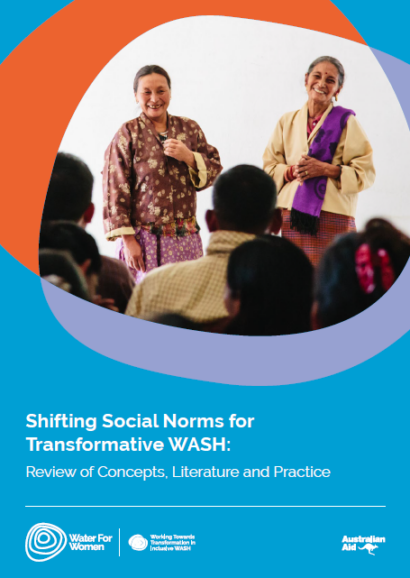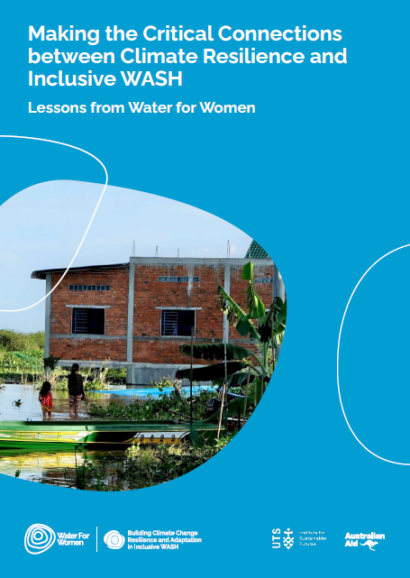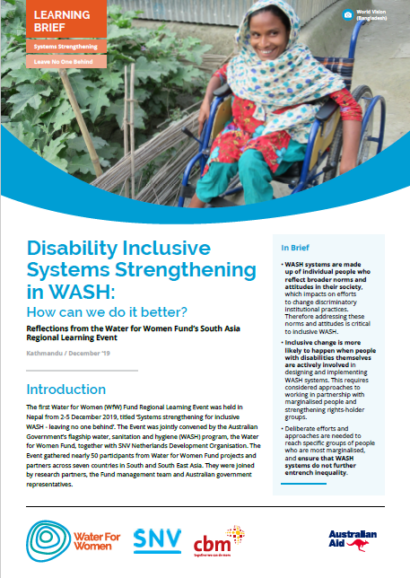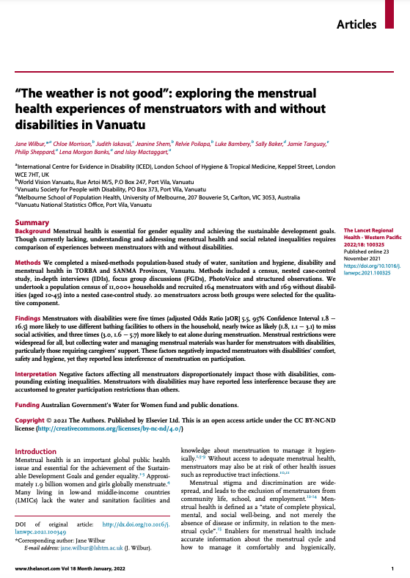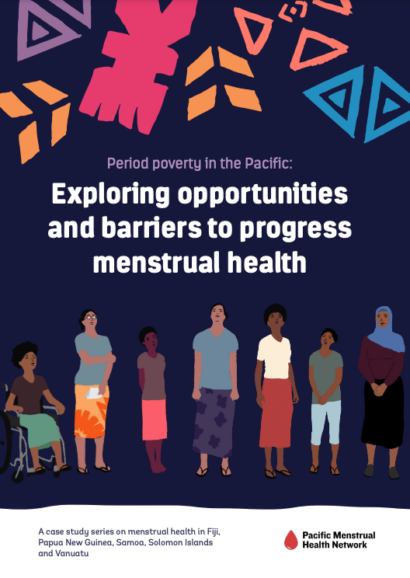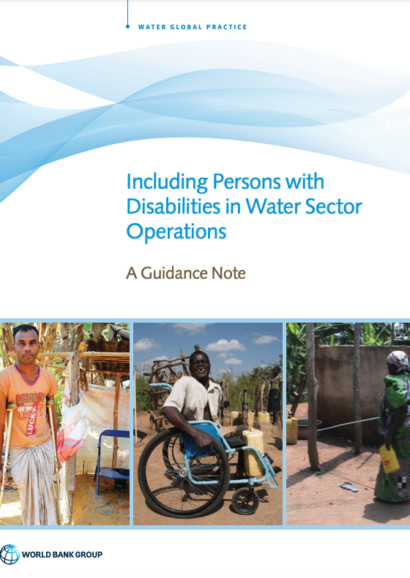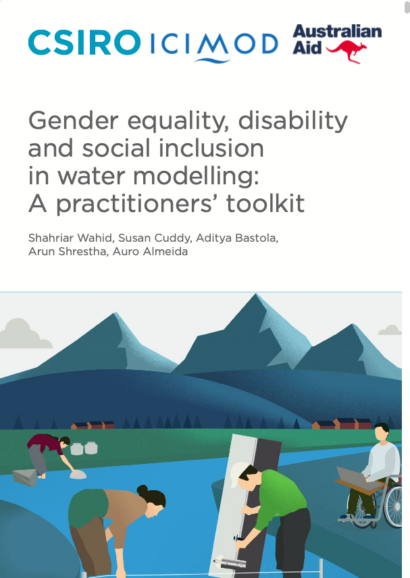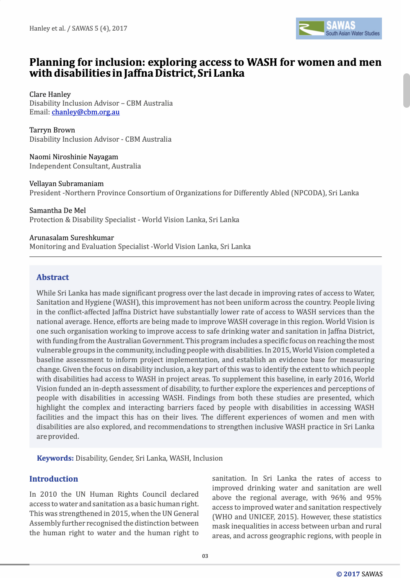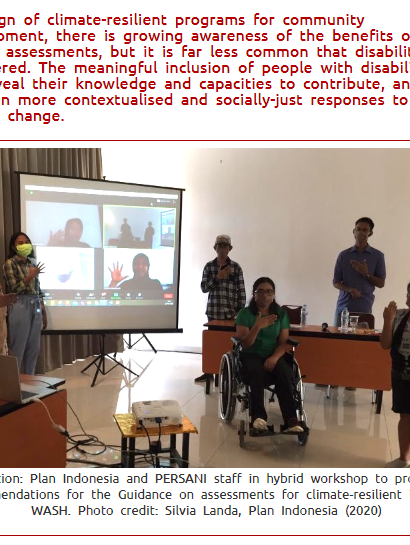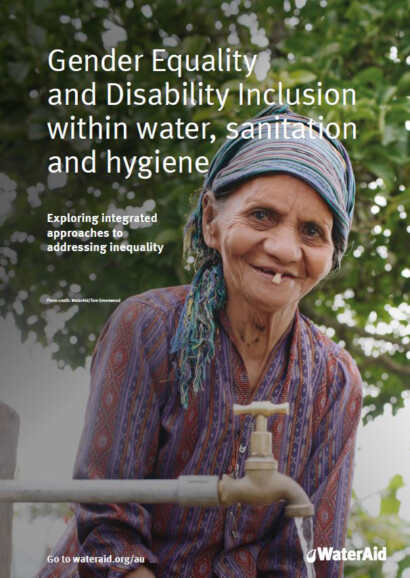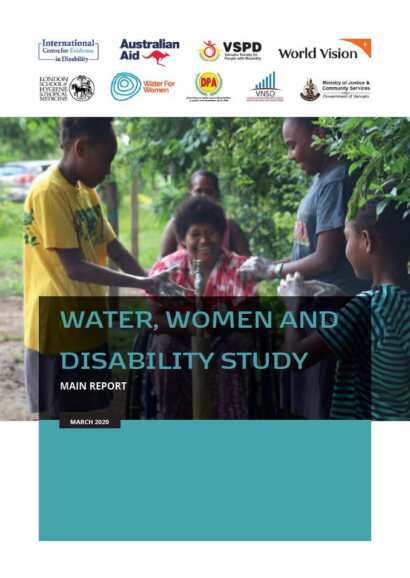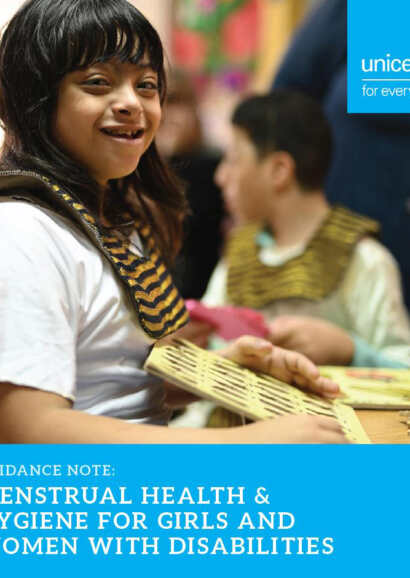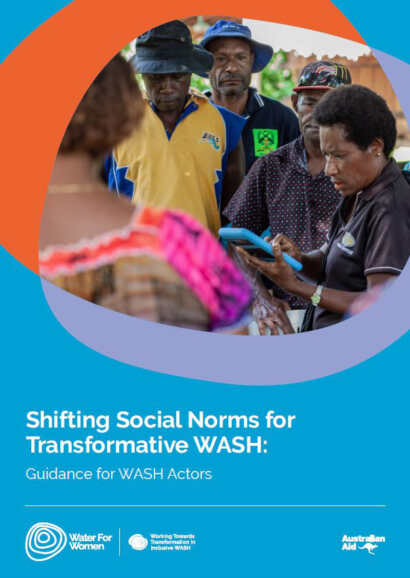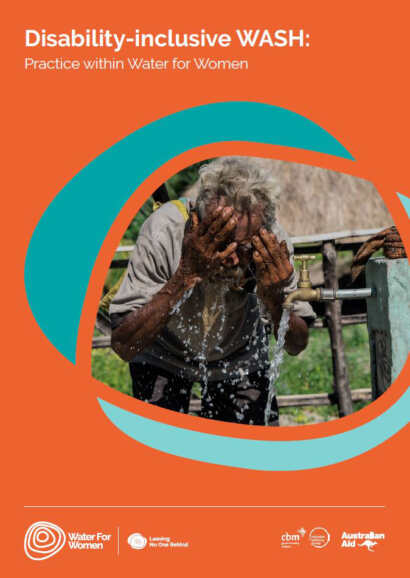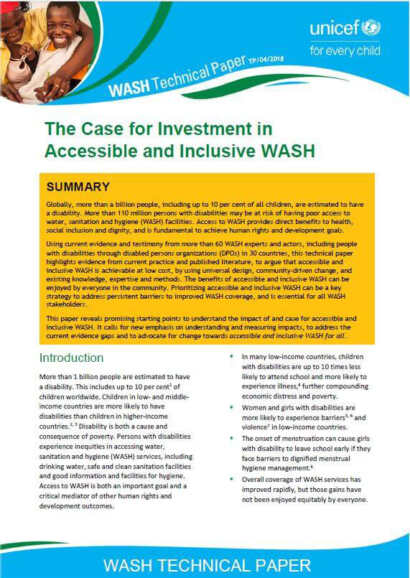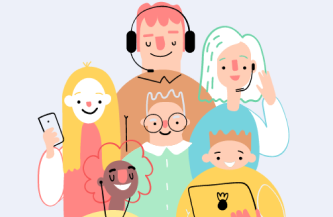Water for Women (2025) Hardwiring Accessibility: Measuring What Matters for and by People with Disabilities
This brief shares lessons on advancing accessibility in WASH services and systems, drawn from the experience of Water for Women partners across Asia-Pacific during the past seven years.
Water for Women (2024) The Criticality of GEDSI for Climate-Resilient WASH
This learning brief shares key findings and insights from the third learning group about the criticality of gender equality, disability and social inclusion (GEDSI) for climate-resilient inclusive WASH.
Water for Women (2024) What Does Climate-Resilient Inclusive WASH Look Like? Insights from Water for Women
Under our collaborative Learning Agenda 2023-24, drawing on learnings from the implementation of climate-resilient and inclusive WASH projects and research across Asia–Pacific, partners sought to explore this fundamental learning question through a series of dedicated initiatives.
Water for Women (2022) Leaving No One Behind: Experiences from Water for Women
This report is based on a methodology in which CSOs’ LNOB approaches were collated, shared, and used to facilitate participatory engagement for peer-to-peer learning between CSOs to deepen understanding and improve practice.
Water for Women (2022) Leaving No One Behind: Summary of lessons from Water for Women
As part of a dedicated initiative under Water for Women’s Learning Agenda, insights on LNOB approaches from CSO implemented projects are captured in a detailed report and summarised here.
Water for Women (2022) Shifting Social Norms for Transformative WASH: Review of Concepts, Literature and Practice
This review, along with the allied guidance, is intended to support WASH actors with relevant examples of how to change harmful and exclusionary social norms in the context of WASH programming.
Water for Women (2021) Making the Critical Connections between Climate Resilience and Inclusive WASH: Lessons from Water for Women
This report features 12 vignettes from Water for Women partners working on projects in the Asia-Pacific that are helping to build climate resilience through inclusive and sustainable WASH programs and research.
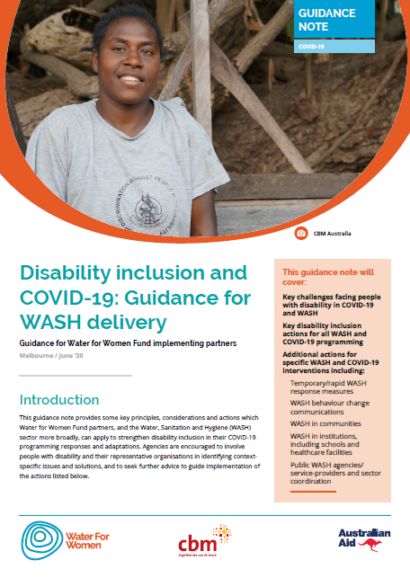 Read more about Water for Women (2020) Disability inclusion and COVID-19: Guidance for WASH delivery
Read more about Water for Women (2020) Disability inclusion and COVID-19: Guidance for WASH delivery
Water for Women (2020) Disability inclusion and COVID-19: Guidance for WASH delivery
Developed by Water for Women and CBM Australia to provide some key principles, considerations and actions which Water for Women Fund partners, and the WASH sector more broadly, can apply to strengthen disability inclusion in their COVID-19 programming responses and adaptations.
Water for Women (2019) Disability Inclusive Systems Strengthening in WASH: How can we do it better?
This Learning Brief aims to advance the Fund’s collective learning on these issues by reflecting on the discussions throughout the Systems Strengthening for Inclusive WASH learning event held in December 2019 in Nepal.
Wilbur, & & Morrison, C (2023) Adapting menstrual health interventions for people with intellectual disabilities in emergencies
This issue will interest practitioners working in menstrual health for people with and without disabilities in the development or humanitarian context.
Wilbur, J et al. (2021) “The weather is not good”: exploring the menstrual health experiences of menstruators with and without disabilities in Vanuatu
Menstrual health is essential for gender equality and achieving the sustainable development goals.
WaterAid Australia (2022) Huggett, C., & Munro, A.K., (2022) Period poverty in the Pacific: Exploring opportunities and barriers to progress menstrual health
This report looks at the current state of menstrual health across the Pacific region, and presents key findings and recommendations to progress it.
World Vision Vanuatu & London School of Hygiene & Tropical Medicine (2020) Water, Women and Disability study in Vanuatu
Safely managed drinking water, sanitation and hygiene (WASH) are essential to human health and well-being.
World Bank (2017) Including persons with disabilities in water sector operations: a guidance note
The note collates recommended strategies and practices in disability-inclusive development programming.
Wahid S et. al (2024) Gender equality, disability and social inclusion in water modelling
Sustainable water management can benefit from Gender Equality, Disability and Social Inclusion (GEDSI) concepts.
FAO (2023) Applying gender equality, disability, and social inclusion principles in agricultural water resources management
Water resources management, although rooted in technical disciplines such engineering, science, data management, modelling, and hydroeconomics, is fundamentally a realm of social and political interactions.
UN Africa Renewal (2023) Inclusive water systems for persons with disabilities are integral for achieving SDGs
Water viability is an engine of sustainable development for environmental social safeguards and governance. Ensuring its availability for everyone is imperative.
Hanley et al (2017) Planning for inclusion: exploring access to WASH for women and men with disabilities in Jaffna District, Sri Lanka
Findings from two studies are presented, which highlight the complex and interacting barriers faced by people with disabilities in accessing WASH facilities and the impact this has on their lives.
IDA (2010) Statement on the right of people with disabilities to water and sanitation
The right to water and sanitation is inextricably linked to the rights to live in the community, the right to accessibility, and the rights to life, health, adequate standard of living and social protection, which are all contained in the CRPD.
Megaw,T, Gero,A & Kohlitz, J (2022) “Nothing about us, without us!”: Disability inclusion in community-based climate resilient programs. A case study of Indonesia
This resource highlights the importance of, and how to achieve meaningful inclusion of people with disabilities within climate change programs and WASH services.
Human Rights Watch (2017) Going to the Toilet When You Want: Sanitation as a Human Right
This report provides a wide range of examples which highlight the additional discrimination faced by people with disabilities accessing sanitation in a range of settings, particularly how this may impact and effect women and girls with disabilities.
WaterAid Gender Equality and Disability Inclusion within water, sanitation and hygiene
The paper is intended as a conversation starter for WASH program managers and other development practitioners looking to strengthen their conceptual and practical understanding of challenges and successes in integrating gender and disability in WASH.
Coultas, M. and Iyer, R. with Myers, J. (2020) Handwashing Compendium for Low Resource Settings: A Living Document
This compendium from the Sanitation Learning Hub at the Institute of Development Studies aims to inform the design of handwashing facilities and hygiene promotion activities, particularly in response to the COVID-19 pandemic.
World Vision Vanuatu & London School of Hygiene & Tropical Medicine (2020) Water, Women and Disability study in Vanuatu
This Water, Women and Disability study, the baseline study for the Laetem Dak Kona (LDK) Project, aimed to complete a comprehensive mixed-method (qualitative and quantitative) population-based study of disability in TORBA and SANMA Provinces.
UNICEF (2021) Menstrual Health & Hygiene for Girls and Women with Disabilities
This tip sheet offers a framework for supporting menstrual health and hygiene (MHH) and practical entry points for meeting the needs of menstruators with disabilities
Water for Women (2022) Shifting Social Norms for Transformative WASH: Guidance for WASH Actors
This guidance note refers to social norm change in, and through, WASH programs.
Water for Women (2022) Partnerships for Transformation: Guidance for WASH and Rights Holder Organisations
This guidance provides practical recommendations for effective collaboration in all types of partnerships.
Water for Women (2021) Disability-inclusive WASH: Practice within Water for Women
This learning brief explores key lessons learnt from implementing disability-inclusive WASH projects and research across Water for Women.
UNICEF (2018) The Case for Investment in Accessible and Inclusive WASH
This technical paper highlights evidence to argue that accessible and inclusive WASH is achievable at low cost, by using universal design, community-driven change, and existing knowledge, expertise and methods.


